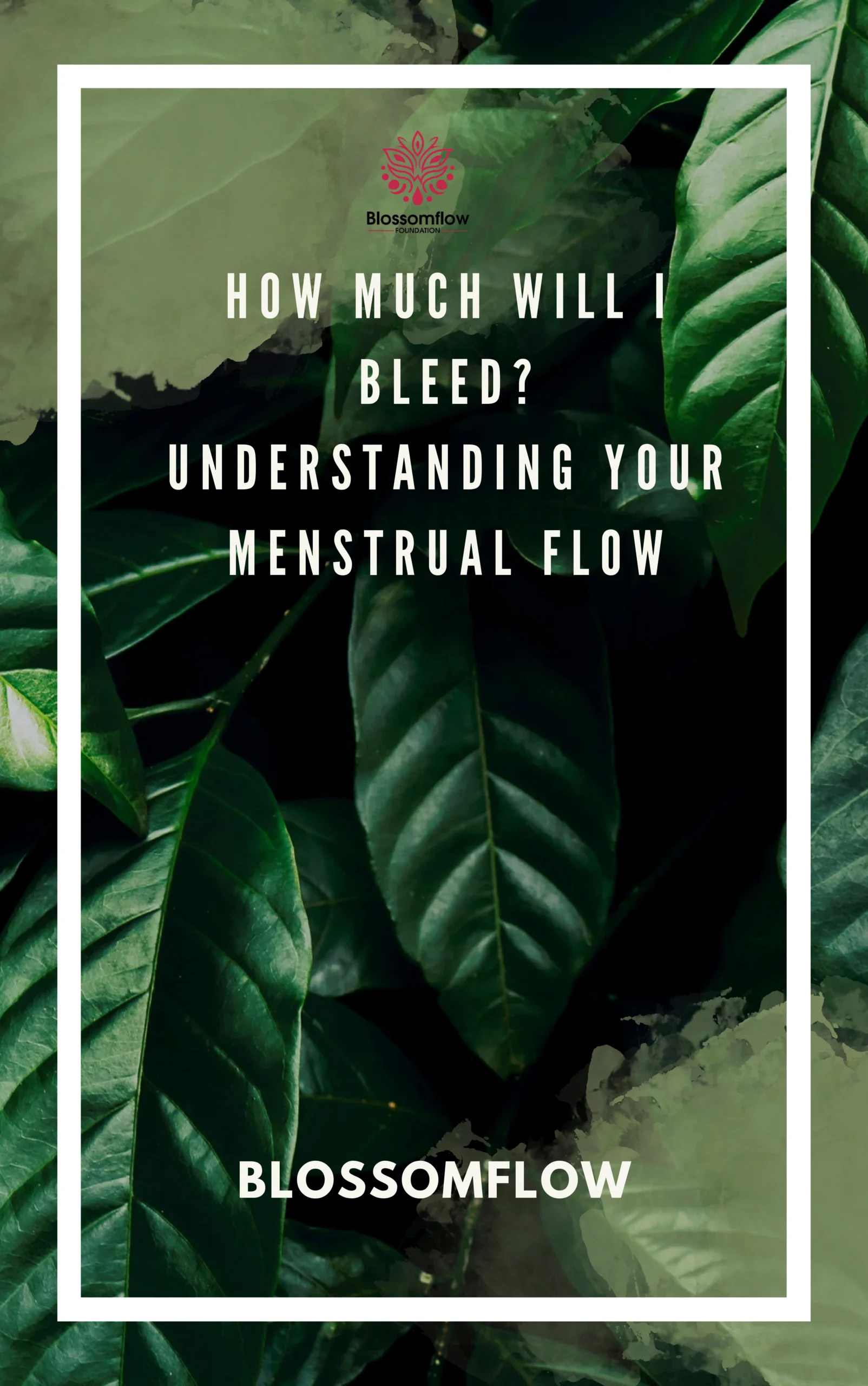
How Much Will I Bleed? Understanding Your Menstrual Flow
Introduction
For many women, the menstrual cycle is a monthly routine, yet questions like “How much will I bleed?” remain common. Menstruation is a natural biological process, but the experience can differ greatly from one person to another. Understanding what is normal for your body and recognizing any changes can help you maintain better menstrual health and peace of mind.
In this blog, we’ll explore the basics of menstrual flow, what to expect, and when it might be time to consult a healthcare professional.

What is a Normal Period?
A “normal” period can range widely, but most women experience bleeding for about 3 to 7 days. The amount of blood lost is typically between 30 to 80 milliliters, or roughly 2 to 6 tablespoons.
It’s important to remember that what’s normal for one person may not be the same for another. Periods can vary in flow, color, and texture, influenced by factors like age, hormonal changes, and overall health.
Understanding Menstrual Flow: Light, Moderate, and Heavy
Menstrual flow can generally be categorized as light, moderate, or heavy. Here’s how to distinguish between them:
- Light flow: This may look like spotting or a very light bleed. It’s often seen at the start or end of a period.
- Moderate flow: This is the most common flow, where you may need to change your pad or tampon every few hours.
- Heavy Flow: You may need to change your pad or tampon every hour or less. Heavy periods can be accompanied by large clots and may be a sign to see a healthcare provider.
How to Track Your Menstrual Flow

Keeping track of your menstrual flow can help you understand your body better. Use a period tracking app or a journal to note down the number of pads, tampons, or menstrual cups you use daily. This can help you spot any unusual changes in your cycle and discuss them with your doctor.
When Should You Worry About Your Menstrual Flow?
It’s crucial to know when your period might be indicating a problem. You should consider seeing a doctor if:
You Soak Through Products Quickly: Needing to change a pad or tampon every hour for several hours in a row.
Your Period Lasts Longer Than Seven Days: Prolonged bleeding can indicate conditions like fibroids or hormonal imbalances.
You Experience Severe Pain or Large Clots: Painful periods or clots larger than a quarter could be a sign of a health issue.
Managing Heavy Periods
Heavy periods, also known as menorrhagia, can be challenging to manage, but there are ways to cope:
Choose the Right Products: Use high-absorbency pads or tampons, or consider a menstrual cup which can hold more fluid.
Stay Hydrated and Eat Well: A diet rich in iron and hydration can help combat the effects of heavy bleeding.
Talk to Your Doctor: In some cases, medication or birth control can help regulate your flow.

Debunking Common Myths About Menstrual Bleeding
There are many myths surrounding menstruation that can lead to confusion and stigma. Let’s set the record straight:
- Myth 1: You Lose a Lot of Blood During Your Period.
Fact: While it might seem like a lot, the average blood loss during a period is only about 2 to 6 tablespoons. - Myth 2: You Can’t Exercise During Your Period.
Fact: Exercise can actually help alleviate cramps and improve your mood. - Myth 3: Menstrual Blood is Dirty.
Fact: Menstrual blood is just blood mixed with the lining of the uterus. It is not “dirty” and should not be considered unclean.
Diet and Lifestyle Tips for a Healthy Menstrual Cycle
Your diet and lifestyle play a significant role in menstrual health. Here are some tips to support a healthy cycle:
Include Iron-Rich Foods: Menstruation can lead to iron loss, so add foods like spinach, beans, and lean meats to your diet.
Stay Active: Regular exercise can help balance hormones and reduce period discomfort.
Manage Stress: High stress levels can disrupt your menstrual cycle, so consider activities like yoga, meditation, or simply taking time to relax.
Disposable Menstrual Products: Strategies for Safe and Hygienic Use
Disposable menstrual products, such as pads and tampons, are popular choices due to their convenience and ease of use. However, using them safely and hygienically is essential to avoid infections and maintain comfort.
Choosing the Right Products: Select pads and tampons based on your flow level. For heavy days, use high-absorbency options, and switch to lighter ones as your flow decreases.
Change Regularly: Pads and tampons should be changed every 4-6 hours, even if your flow is light. This helps prevent bacterial growth and reduces the risk of Toxic Shock Syndrome (TSS), a rare but serious condition linked to prolonged tampon use.
Proper Disposal: Always wrap used pads and tampons in their packaging or toilet paper before disposing of them in the trash. Never flush them down the toilet, as this can cause plumbing issues and environmental harm.
Breaking the Stigma: Talking Openly About Menstruation
Despite being a natural process, menstruation is often stigmatized, leading to embarrassment and silence. It’s essential to break these barriers by encouraging open conversations about periods. Education and awareness are key to reducing period stigma and ensuring everyone has access to the resources and support they need.

Conclusion
Understanding your menstrual flow is an important part of overall health. While periods can vary widely from person to person, knowing what’s normal for you and being aware of any changes is crucial. If you have concerns about your period, don’t hesitate to consult a healthcare professional.
Remember, your period is a natural part of life, and there’s no need to feel embarrassed or ashamed of it.
FAQs
How much blood loss is too much during a period?
A: If you’re soaking through a pad or tampon every hour for several consecutive hours, it could be a sign of excessive bleeding. Consult a healthcare provider for guidance.
Can I swim during my period?
A: Yes, you can swim during your period. Tampons or menstrual cups are recommended for swimming as they prevent leaks and are comfortable to use.
Is it normal to have clots during menstruation?
A: Small clots, especially on heavier days, are normal. However, large clots or frequent clotting can indicate a health issue and should be discussed with a doctor.
Can I skip my period with birth control?
A: Some birth control methods can be used to skip periods. Speak with your healthcare provider to see if this option is right for you.
What foods should I avoid during my period?
A: It’s a good idea to limit salty, sugary, and caffeinated foods, as they can increase bloating and discomfort during your period.
All Categories
Recent Posts
Why SDG 4 Cannot Be Achieved Without Ending Period Poverty
Tags
Give them a helping hand
Every donation fuels our mission to combat period poverty. Your generosity brings us closer to menstrual equity.
+234-909-482-1642
inquiries@blossomflow.org




